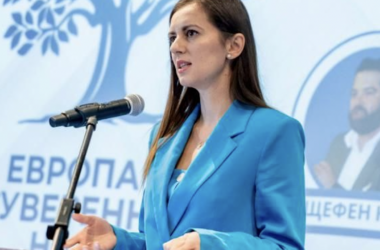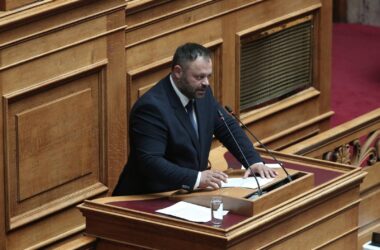Kostadin Kostadinov is a Bulgarian politician, historian, and leader of the nationalist party Vazrazhdane (Revival). Born in 1979 in Varna, he holds a degree in history from Sofia University and has been actively involved in Bulgarian politics for over a decade. Known for his strong Eurosceptic, anti-federalist stance, Kostadinov advocates for Bulgaria’s sovereignty, and the preservation of national identity. He has been a vocal critic of EU policies, NATO, and liberal-globalist influence in Bulgarian affairs. Under his leadership, Vazrazhdane has gained support for its calls for Bulgaria to exit the EU, migration policies, and its opposition to sanctions on Russia, which have hurt European economies.
The European media has been abuzz with comments from you, the leader of Bulgaria’s “Revival” party, regarding Bulgaria’s claim to areas in Ukraine historically inhabited by ethnic Bulgarians. What steps, in your view, should the Bulgarian government take in this regard?
First, it’s essential to clarify that this refers to Southern Bessarabia, a region that was part of the First Bulgarian Kingdom from the 7th to the 11th century and later within the Second Bulgarian Kingdom from the 12th to early 14th centuries. Over different historical periods, Bulgaria controlled Southern Bessarabia for more than 600 years. Bulgarians have lived in this region since the 6th century—before the formation of the Bulgarian state—and today, they remain its largest ethnic group, comprising over 50% of the population.
In contrast, Ukraine has administered this territory for just 34 years. If Bulgaria were to pursue this claim, the first step would be to formally present its demands to Ukraine. This would require lifting sanctions on Russia, imposing sanctions on Ukraine’s ruling regime, and taking diplomatic and legal measures to change the region’s status. International recognition would be crucial, especially given that Ukraine, as a state, was artificially created and is now visibly destabilizing.
What is your party’s stance on President Trump’s peace initiatives? Do you believe he will succeed?
So far, Trump hasn’t proposed a concrete peace plan—he’s only expressed intentions for peace, which is not the same thing. No tangible steps have been taken yet, but as rational people and European citizens, we all hope the war in Ukraine ends as soon as possible.
Bulgaria has deep historical and cultural ties with both Russians and Ukrainians. We often understand each other without an interpreter, sharing a common religion, script, and traditions. This war is particularly painful for us, and every possible avenue for ending it must be explored.
Predicting whether Trump’s initiative will succeed is difficult. The resolution of the Ukraine conflict will likely involve two stages: first, direct negotiations between Russia and Ukraine, followed by a broader international peace conference. Countries like Bulgaria, which have their own historical claims to Ukrainian territories, should play a role in this process. As previously mentioned, Ukraine exists in its current form due to decisions by Soviet Communist Party leaders, not because of historical legitimacy.
From Bulgaria’s perspective, what should a conflict resolution framework include? How can future conflicts be prevented?
For a lasting peace, minority rights in Ukraine must be safeguarded. One of the main drivers of the conflict was the systematic discrimination against the Russian minority, which numbers over 15 million—the largest in Europe. If their rights, along with those of other ethnic groups, aren’t protected, the peace process will not be sustainable.
Even if the war ends with a formal peace treaty rather than a temporary ceasefire, stability depends on addressing the root causes of the conflict. For 35 years, Ukraine’s political elite has pursued an openly anti-Russian agenda, further inflamed by external influences. The goal has been to turn Ukraine into an anti-Russia stronghold—a strategy openly discussed by American geopolitical thinkers like Zbigniew Brzezinski in The Grand Chessboard. Once this policy ceases to be a driving force, and historical realities are restored, the basis for the conflict will disappear.
Your party has long criticized EU sanctions against Russia. Should Bulgarian businesses be among the first to re-enter the Russian market? What about resuming flights and easing visa restrictions for Russian tourists?
At present, Bulgaria lacks active diplomatic and economic ties with Russia. The immediate priority should be lifting sanctions on Russia, a step that “Vazrazhdane” will soon propose in Parliament. However, this proposal is unlikely to pass due to external influence over Bulgaria’s political establishment—not from the “American government” in a broad sense, but specifically from organizations linked to the U.S. Democratic Party and institutions like the National Democratic Institute.
Our research revealed that numerous Bulgarian media outlets receive direct funding from U.S. government agencies like USAID. Between 2016 and 2020, when Donald Trump was president, these outlets published thousands of negative articles about him. This raises the question: does the U.S. truly function as a unified entity, or are there deep-state factions shaping its policies?
Trump aims to disrupt this system, but whether he will succeed remains to be seen. For Bulgaria, the priority is clear: protecting our national interests. This means reestablishing strong, friendly ties with Russia, with whom we share deep historical, economic, and cultural connections. Severing these ties benefits other nations, not Bulgaria. Restoring them is a matter of national importance, and we will do everything possible to achieve this as soon as possible.




